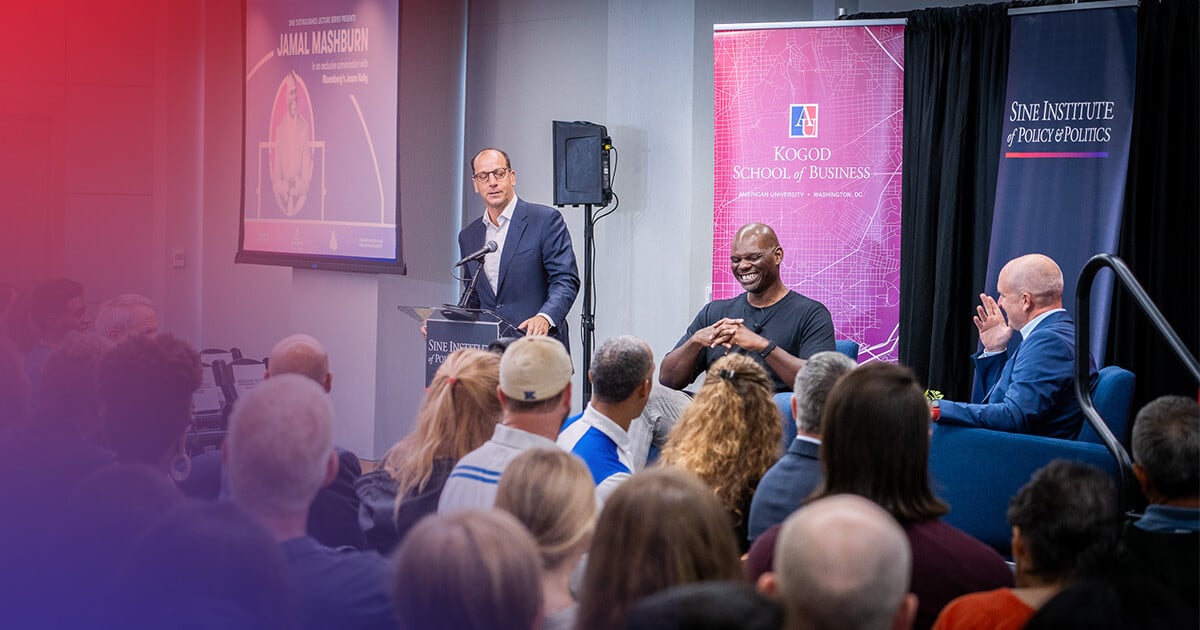
Kogod School of Business
It’s safe to say the entrepreneurial spirit found former NBA star Jamal Mashburn at a young age.
Born and raised in Harlem, his inspiration came in bits and pieces. Jamal recalls watching his mother, a New York city employee, balance books as part of her job, all while instilling in him a sense of fearlessness. “I had no blueprint,” he says now. “My mom was the blueprint to give me those core values to be courageous.”
Plus, there was that proverbial “lightbulb moment” he’d often have while sitting on the New York subway, watching business professionals walk by in suits, carrying briefcases, with Mashburn often wondering what might be inside.
“I was always curious about that,” he told a captive audience last month at the Kogod School of Business.
Those early experiences, along with a father who he says struggled to find purpose after a career as a professional boxer, set the stage not just for his own successful professional basketball career, but for nearly unparalleled success in the years since.
Indeed, it’s largely what Mashburn has done as an entrepreneur since his NBA retirement two decades ago that spawned his invitation to the AU campus on September 27. He spoke as part of the Sine Distinguished Lecturer Series, hosted during the university’s fall family weekend.
“It’s not because of his basketball career, but because of his full cycle of life,” said Kogod Dean David Marchick, who introduced Mashburn—and in the process noted the NBA star’s place among professional athletes who found the greatest success, post-retirement, from Roger Staubach to Bill Bradley to Earvin “Magic” Johnson.
“Jamal Mashburn,” Marchick added, “has to be at the top of that list.”
Speaking to faculty, staff, students, families, and distinguished guests from the AU Board of Trustees and AU athletics, Mashburn recounted his professional journey. It’s one met with deep appreciation at Kogod, where a rich culture of entrepreneurship sees students, from the time they walk on campus, imagining concepts for real-world startups and pitching new and innovative ways to drive change through business.
“It hasn’t been a series of careers for you. It’s been one career, intertwined,” remarked Jason Kelly, Bloomberg chief correspondent and host of The Deal podcast, who moderated the discussion.
Today, Mashburn helms a series of successful enterprises. He’s the founder and principal of Helen Holdings and boasts experience in a wide range of sectors from media, sports, and entertainment to tourism, hospitality, food and beverage, waste management, and real estate.
Mashburn is a bona fide expert in financial analysis and international negotiations and has helmed a portfolio featuring scores of well-known restaurant franchises and car dealerships.
Kelly noted that Mashburn was ahead of his time as a professional athlete by branching beyond the court into the business world.
“We talk about this empowered athlete, whether it’s Steph Curry or Lebron James."
It’s now a given that once you’re in high school, you’re starting to think about yourself as a brand."

Jason Kelly
Chief Correspondent, Bloomberg
“That’s not new to you," Kelly said, turning to Mashburn.
To be clear, Mashburn found plenty of success on the court.
A standout at the University of Kentucky, he played in one of the most memorable NCAA Tournament games of all time, appearing (albeit on the losing end) in the 1992 regional final saw “The Shot” by Christian Laettner lift Duke over the Wildcats in overtime.
The fourth pick in the 1993 NBA Draft, Mashburn reached the league’s All-Star Game and scored an average of 19 points per game over a dozen seasons.
All the while, though, Mashburn dreamed of a life beyond basketball, as he told the AU audience. He hoped to one day be the businessperson with the briefcase—a goal he emphasized as early as high school, where he proclaimed his larger aspirations to college coaches, briefcase in hand, while taking calls as one of the nation’s most highly-sought recruits.
Today, as an equally renowned speaker at Fortune 500 events, Mashburn discusses team building with an authority gleaned from his unique combination of professional experiences.
“As I’ve started to look around, build teams, and add people to an organization, I’ve started to assess what value they bring to the table: things I can’t see, and things I can see,” Mashburn told the audience, before using his on-court experience as a metaphor for hiring.
I like to score. If I’m putting together five basketball players, I’m not putting four other scorers with me because I won’t get the ball. I’m getting a guy that can pass, a guy that can block, a guy that can screen, a guy that can rebound, and probably another scorer to diversify it.”

Jamal Mashburn
Entrepreneur and Former NBA Player
This perspective is highly relevant to Kogod. For instance, assembling and scaling teams capable of driving results is an integral part of the Department of Management’s curriculum, where students gain valuable experience in entrepreneurship, strategy, organizational behavior, and global business citizenship.
Simultaneously, students tap into a wealth of experiential opportunities through the Veloric Center for Entrepreneurship and benefit from unparalleled access to world-class leaders from the political and business spheres—including through programming at the nonpartisan Sine Institute of Policy & Politics, whose collaboration with Kogod brought Mashburn to campus through the organization’s lecturer series.
“It’s brought astronauts and ambassadors, CEOs, prominent journalists, mayors, and others to campus,” said Amy Dacey, Sine Institute executive director—noting past visits by the leaders of Booz Allen Hamilton, Patagonia, and business leader and philanthropist David Rubenstein.
Yet, Mashburn told the audience, being mentioned in the same sentence as such accomplished executives is merely a starting point.
“I think the thing for me is, how do I continue to make an impact,” he said. “I like to impact people behind the scenes.”
